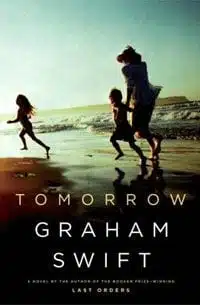
Graham Swift has been on the literary map for quite some time. With the Booker Prize-winning Last Orders, along with other fantastic works such as Waterland and The Light of Day, it is no wonder he is considered one of England’s finest living writers.
Now, over four years since his carefully-wrought detective novel The Light of Day, Swift is back with Tomorrow. It is a novel that seems small at first, both in stature and in page count, but it attempts to tackle some pretty big, pretty murky emotions. Paula Hook, wife of Mike, sits awake and tries to recount to the reader the history of their love and their family. It is the night before the looming tomorrow mentioned in the title, and Paula is speaking to her sleeping children, trying to prepare them for the big news that’s coming. News that could change everything for them.
As a narrative, Tomorrow is very similar to Swift’s Waterland. Both books have narrators that manage to conflate personal history with group history. In this case, Paula is clearly mining her and Mike’s past, trying to define their happiness in some way, but also trying to use their past to convince their children of the strength of their bond, and hoping that bond will translate to the family as a whole.
The forced convincing she is constantly trying to convey is clearly tied to the big news they are about to drop on their children, but there is something else going on in Paula’s monologue that is a little more disturbing. Like Tom Crick in Waterland, Paula lets her thoughts get away from her and the subjects she touches on become awkwardly inappropriate. Also like Crick she often gets bogged down in sex. That she isn’t talking directly for her children does not negate the strangeness of her speech. She talks openly of the young love she shared with Mike, in all its physicality, and even speaks of both her and her husband’s other sexual exploits in their younger days. The unabashed disclosure she offers her children — though again, they’re not there to listen — hints at her own struggles as she sits awake at night, and it is these inner demons that eventually take over the gimmicky tension of what news is coming and truly drive the story.
That Paula is so clearly obsessed with the act of sex — in particular how often and with what amount of passion her and Mike had it — reveals a doubt in the family’s current status. The longer Paula sits up and talks to herself (or her children) the more she clearly becomes worried about the fallout of their news, and not just for the children. She claims she will stand resolute, and that she must tell the children this big secret, but what crumbles as she keeps talking is our belief that she can handle what’s about to come.
Swift captures her waves of fear and apprehension well, often letter her sentences tumble over each other, and making her over-apologize to her children before so often recanting. The manner of delivery though — with Paula merely sitting up in bed, next to her sleeping husband for the entire novel — is a bit clunky to ease into. Since Tom Crick was a broken history teacher, to wax reminiscent was in his nature, and it made the scattered, troubling narrative in Waterland more organic. Here, the set-up for Paula’s voice is a little more forced, and from time to time you can feel the limits of this narrative stretched to their breaking point.
Still, Swift manages to keep the story moving reasonably well. And though we don’t get to see the morning scene, where Paula and Mike give up the big secret to their children, there is a nice resonance to how the book ends. That rippling comes not only in the fast-approaching confrontation, but also in the moment where we, as the reader, remember Mike. He’s still asleep next to Paula, and he hasn’t heard all that we have, doesn’t see Paula’s worries unravel over the course of the night. Tomorrow is the calm before a storm, and Swift once again gives us a book full of characters to care about, and worry for.
